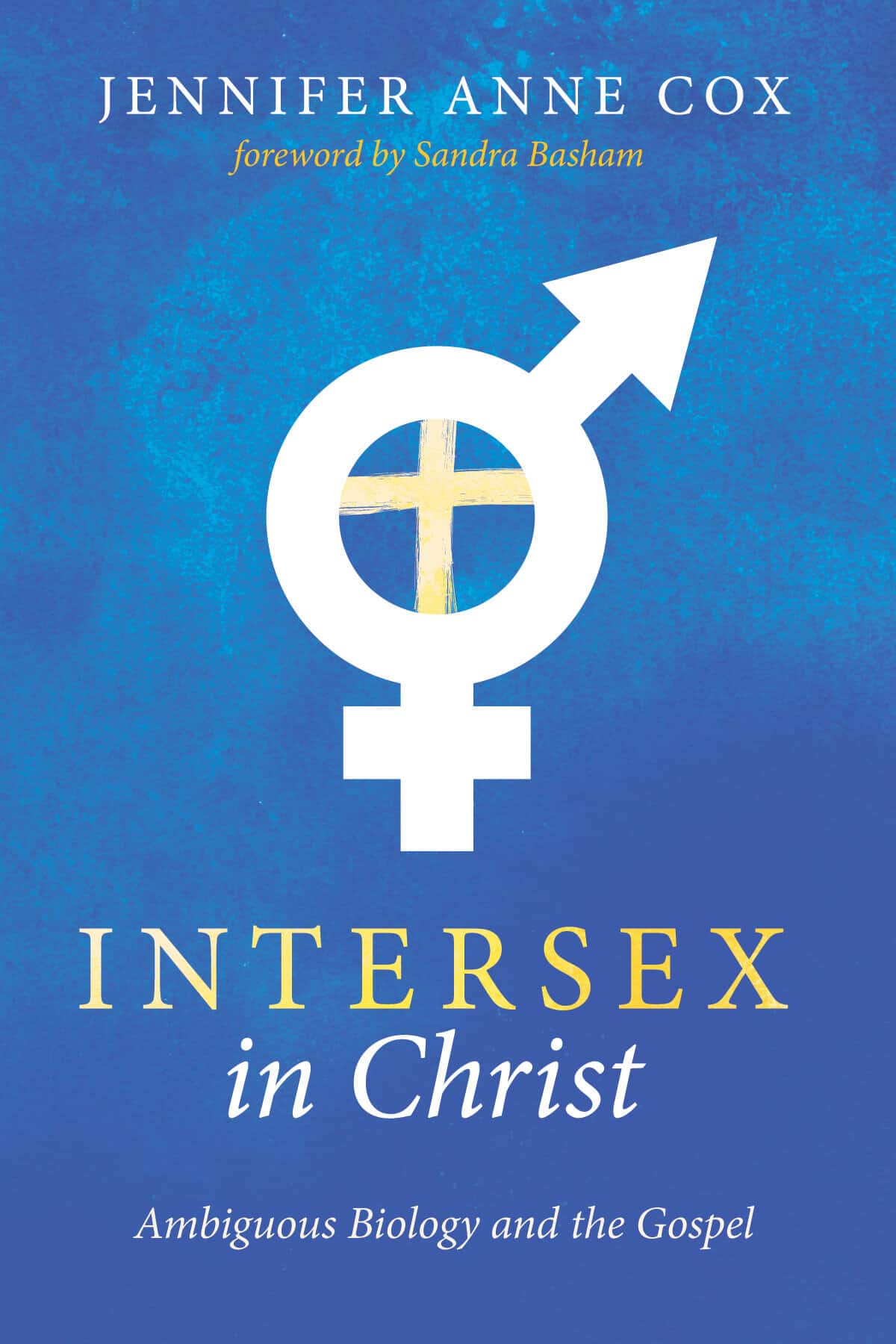
What does it mean to be born with an intersex condition?
Jennifer Anne Cox wrote her book Intersex in Christ: Ambiguous Biology and the Gospel as an evangelical response to intersex. Her message to evangelical Christians is this: the Gospel is as much for someone with an intersex condition as it is for you. Stop abusing these people.
“True” Sex?
A number of Christian scholars claim an intersex person’s “true” sex can be determined from some indicator of God’s creational intent, so I was a bit surprised when Cox didn’t follow that well-trodden path. Instead, Cox addresses intersex without reducing the complexity of human biology to the presence or absence of a Y chromosome. She doesn’t lecture intersex people about embracing the binary; our bodies are fine the way they are.
Indeed, after discussing 1 Corinthians 7:17-24, she says:
“It is quite acceptable to live with the gender assigned at birth and even possibly scribed into the flesh by surgery. God would not see this as a sin. The situation in which the intersex person finds himself or herself when coming to know Jesus as Lord is a situation in which that person may validly remain. However, it is not a sin to transition to the other gender. There is abundant grace in Christ. A decision about gender for the intersex person should be made according to grace and with the guidance of the Holy Spirit. The fact that this is difficult and may take some time to work through is not an insurmountable problem. Christians should recognize the grace of God in this matter and support the intersex person in the decision-making process.”
As a Christian with an intersex condition, I’m too close to this subject to give an entirely unbiased review, but for that statement alone I will be giving copies of this book to evangelical leaders and Christian friends willing to read it. And I dearly wish those who signed the Nashville Statement would take the above quote to heart.
Male or female in heaven?
My mother once asked me whether I thought I’d be male or female in heaven. I told her that I didn’t know and wouldn’t care. My Redeemer loves me.
Cox insists that our resurrected bodies will be binary—entirely male or female. Like many Christians, she dismisses the verses that speak about a lack of sex—or at least sexual function—in our new bodies. She writes:
“Intersex bodies will be healed; intersex people will be restored according to God’s creative intent. This is not to say that identity will be in question since identity is secured in Christ. However, which intersex person will be male and which female cannot be known in the present.”
So, rather than pointing to the presence or absence of a Y chromosome to determine ‘true’ sex, she maintains that only God knows, and God will make that clear at the Resurrection. There will be no marriage in heaven. No sexual activity. No reproduction. The point of our resurrected bodies being sexed, according to Cox, is thus:
“Being male and female is a very significant part of being human because this difference enables people to be ‘fellow humanity.’ Human sexual differentiation is part of our creaturehood. Therefore, we must expect that in the resurrection male and female sexual distinctions will remain.”
According to some evangelicals, being male or female is essential to our humanity. They believe that being intersex is a disorder that can be healed without changing our identity. That a binary sex is so central to our being that our resurrected bodies must be sexed, but intersex will be erased.
At a glance, my body is female—wrinkles, sagging skin, and all. My gender wanders at times but remains well within the bounds expected of a woman. That’s me. If I rise from the dead with a completely female body, I won’t complain. It would seem odd to me, however, to suddenly have a functional reproductive system in a place where such will never be used.
If I rise from the dead with a completely male body, I won’t complain. But my gender would also need to change.
I agree that our bodies are an important part of our selves. In the Resurrection, our bodies will still reflect our selves. If someone who lived most of her life as a woman—though intersex—is resurrected with a functional male reproductive system—how can that still be her self?
And we shall surely be recognizable as ourselves in our new bodies. As Job said:
“I know that my redeemer lives and that in the end, he will stand on the earth. And after my skin has been destroyed, yet in my flesh, I will see God; I myself will see him with my own eyes—I and not another. How my heart yearns within me!” —Job 19:25-27
Reaching those with an intersex condition
I won’t recommend Cox’s book to my intersex friends who aren’t Christians, because Cox isn’t writing to them. But I hope enough evangelicals read Intersex in Christ that the attitudes of Christians toward intersex people change. From what I’ve read in this book, I suspect the author shares that same vision:
“We must love people as they are, while also considering what they will become.”
Some Christians have made a point of telling me that intersex is a result of the Fall. Okay. But if you tell a woman in labor that her pain is due to the fall of mankind into sin, she’ll never let you share the Gospel with her. Love her first. Help her through that pain. Show her you care.
When trying to reach someone who is intersex with God’s love, you can’t start with a view that we’re physically broken. And be aware that the words you consider ‘the truth in love’ can still injure us. As Cox writes:
“It is false to declare that everything that occurs naturally is intended by the Creator to be that way. Not everything that exists necessarily ought to exist.”
To me, that sounds like the author is saying, “You should not exist.” Is that fair of me? Perhaps not. But don’t expect an intersex person who reads this book to respond well to such things.
Remember that, as a person with an intersex condition, I am not unbiased. I interpret language through the context in which I live and my particular history as both a Christian and intersex. I don’t believe the author meant anything untoward by her statement, but we who are intersex—at least in my generation—live in a world altered by trauma. This trauma is not caused by our being intersex but rather by how people react to our differences.
It’s not that unusual for Christians to try to erase intersex. By minimizing our numbers. By reducing sex to a single biological parameter. By assuming that we’re unhappy with our bodies. By calling intersex a medical disorder, rather than a part of the diversity of God’s good creation. By telling us we need or want to be healed. By looking for our ‘true’ sex. By objecting to the gender we choose.
It’s unfair to suggest that this book actually says any of those things. But a number of my intersex friends are understandably sensitive, so I’m not likely to recommend the book to them, except as something to give their Christian friends.
I’m delighted that Cox quotes so many intersex people throughout the book. It shows that she did her homework and that she cares to listen to us. But I hope that she has taken or will take the time and effort to develop intimate friendships with enough intersex people to really understand us, so we can hear the truth in her words when she writes:
“…this does not necessarily imply that people who are unambiguously sexed are closer to the image of God than those who are intersex…to intersex believers, I want particularly to emphasize that you are acceptable to God without alteration, because you are created in his image, made because of love, and are valued and dignified as an intersex person.”
 Lianne Simon is the author of essays and novels about what it means to live as an intersex person. An Oriented to Love alum, she is partnering with theologian Megan K. DeFranza on a documentary about intersex and faith. This article first appeared on her website and is reprinted here with permission.
Lianne Simon is the author of essays and novels about what it means to live as an intersex person. An Oriented to Love alum, she is partnering with theologian Megan K. DeFranza on a documentary about intersex and faith. This article first appeared on her website and is reprinted here with permission.


One Response
Sadly, my experience of condemnation from an evangelical pastor in the UK once I came out typified the general perception of the churches in general that we’re nothing more than freaks and God doesn’t love us.
I failed to convince him that we’re all made in God’s image yet we’re chosen to walk a harder path with this special gift.
I found an hermaphrodite statue online, approximately dated 200 year’s BC.
It shows that we lived in a period of time before christ in better times than today.
Our special gift of gender needs separating from sex.
Intersex doesn’t mean we’re focused on sex as much as anybody else would.
We’re hoping to live life free from prejudgemental people